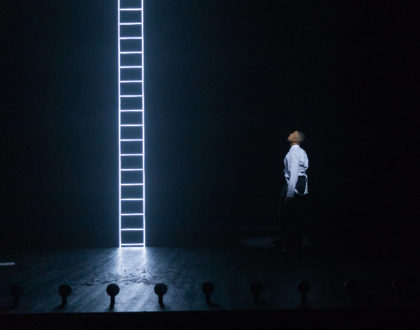The Black Clown, A Gateway for Much-Needed Dialogues in Boston

Photo: Maggie Hall. The American Repertory Theater.
The Black Clown premiered September 5, 2018 in Harvard University’s award-winning American Repertory Theater at the Loeb Drama Center.
The Black Clown is a musical theater experience that fuses vaudeville, gospel, opera, jazz, and African-American spirituals to bring Langston Hughes’ poem of the same name to life.
Bass-baritone and lead performer Davóne Tines (Crossing and Run AMOC! Festival) adapted the poem for the theatrical stage in collaboration with composer Michael Schachter (Run AMOC! Festival). Tines performs the piece alongside an all-black ensemble of twelve talented artists accompanied by an orchestra.
Langston Hughes’ original verses poignantly explore the journey of a black minstrel who casts aside his assigned clown costume and asserts his humanity. Although the poem describes the experience of a black man during the 1930’s, its exploration of the complexity of the black identity resonates today with just as much clarity as it did decades ago. Tines expresses that he was drawn to this piece because “it specifically speaks to a black person’s experience in this country.”
Tines chose to adapt this poem because he wanted to present work that was more connected to his own personal life experience. Tines’ adaptation of “The Black Clown” expands on the concept of a “double consciousness”. In Tines words, the work amplifies the idea of “having the need to perform or put on an outward appearance so that the truth and entirety of a black person’s existence can be digestible or palpable to a group for the purpose of survival.” Black Americans express how they often find themselves modifying their behavior in order to move safely through white spaces. When it comes to work or professional settings, in particular, individuals may code-switch between African-American Vernacular English and a “white voice” as a response to past experiences of miscommunication and prejudice in the workplace.
Photo: Maggie Hall. The American Repertory Theater.
Tines’ theatrical adaptation takes the audience through an emotional journey of joy, agony, and self-reflection. Amongst other things, we are invited to ponder on the meaning of “freedom” following the Emancipation Proclamation. The Emancipation Proclamation was a victory for human rights and a joyous occasion for the black community in the United States. However, what did this “freedom” really mean without land, work or access to school and housing? Choreographer Chanel DaSilva explains how they decided to present this juxtaposition during the song “Freedom” by shimmying with shackles turned into fake boas in order to “shake up our idea of what freedom meant in that time.”
The piece is not about romanticizing the pain or pointing fingers. As a black person, I don’t want to get stuck in anger and I don’t want a white person to get stuck in guilt or shame or finger-pointing. Click To TweetThe Black Clown serves as a gateway for the kinds of cross-community dialogues that the city of Boston needs. During a post-performance talkback, an audience member notes how the audience is predominantly white and seems to be “clapping away at this message that people of color have to perform for people who are white.” The same audience member cites moments in the show where they felt the cast was pointing directly at them. These moments served as a way for the cast to look at the audience the same way they, as black individuals, have felt looked at by others. “I appreciated that,” the audience member affirmed.
The cast underlines that theater has to be a place of teaching where folks can have those kinds of dialogues and exchanges. The cast also clarifies that:
“The piece is not about romanticizing the pain or pointing fingers, and it’s not a place to get stuck in. As a black person, I don’t want to get stuck in anger and I don’t want a white person to get stuck in guilt or shame or finger-pointing. It’s about what can you do with that feeling to push you forward to act to make this world a better place.”
Ensemble member Dawn Bless asserts:
“This piece does what art is supposed to do, which for me as an artist, is it heals us. We are living in a place and space in the world and the country were this poem could have been written this morning. And some might look at this and say, ‘Wow, look at those people clapping and enjoying themselves and singing that spiritual gospel stuff’ but some people will actually be transformed and that is the point.”
It appears that many were transformed by the cast’s performance. The Black Clown culminates with standing ovations as well as audience members who tell the cast: “Thank you for the gift.”
The Black Clown will be showing through September 23, 2018, at the Loeb Drama Center.

